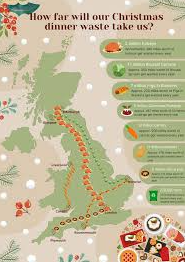With careful planning, you can enjoy the holidays without contributing to food waste and climate change.
Christmas is a time for indulgence, but it’s also a time when food waste spikes, with many buying more than they can consume. This excess often ends up in the bin, contributing to the global climate crisis. To avoid this, Rob Percival, head of food policy at the Soil Association, suggests a simple strategy: “Don’t shop as if you are under siege for a month.”
He warns against buying oversized items like a giant turkey that you won’t finish, which is common in many households. Instead, plan meals carefully, use leftovers creatively, and resist the urge to overstock.
According to the UN, people globally discard 74kg of food per year, which contributes to roughly 10% of the emissions driving the climate emergency. If food waste were a country, it would rank third in terms of emissions, following only the US and China.
Marija Rompani, director of ethics and sustainability at John Lewis Partnership, points out that food waste creates six times more greenhouse gases than the aviation industry. The impact of food waste is far-reaching – from the resources used to produce, package, and transport it to the methane it produces as it decays in landfills. By being mindful of food waste this holiday season, you can make a significant contribution to a healthier planet.








